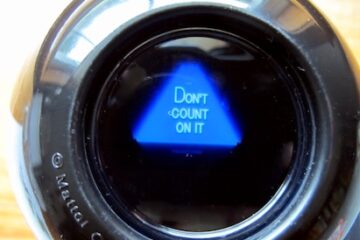Learning to love a year-end review, and a daily practice to keep your self-confidence high
It’s the end of the year. Perhaps you’re dreading performance reviews, either because you have to write them or you have to endure a year-end review with your boss.
HR departments can buy all kinds of products and services promising to make these reviews more efficient and effective. Yet there’s a growing hatred for year-end performance reviews among both bosses and employees. A google search on year-end performance review yields 1.75 billion hits.
Personally, I love year-end reviews when they’re done right. Sadly, they’re so rarely done right.

Photo: Innovated Captures via Adobe Stock
How to make a year-end review awful
There are many terrible, awful, dreadful ways to do year-end reviews. Here are several ways to make everyone hate them:
- Require a 360
While a 360 can be incredibly useful for professional growth, forcing employees to rate each other during annual reviews (especially if bonuses or raises are at stake) will do little more than sow distrust among the team. - Require everyone to use a single format
Standardization is often a worthy goal, but sometimes standardization is a false idol. The tool should support the work—don’t force the work support the tool. - Give a single number rating to each person
A person’s entire year shouldn’t be reduced to a number between 1 and 5. The number usually ends up meaningless anyway—some bosses inflate everyone’s scores while others keep ratings artificially low—unless a boss wants to smack someone down with a low rating. - Set last year’s goals in stone
It’s January 2020. You just set your team’s annual goals with your boss. Fast forward to December. Slavishly grading your team’s performance on those original goals would be breathtakingly unfair. - Surprise your employee with negative feedback
If your employee is surprised by what you say in the annual review, you have been doing a bad job as a manager the other 364 days of the year. - Surprise your boss with sudden demands or complaints
The annual review is the wrong time to make complaints or ask for a raise. By the time you’re in the review conversation, budgets and compensation decisions for the next year have already been made.
How to make a year-end review useful
As a manager, I’ve always welcomed the year-end review process. It’s a lot of work when done right, but I don’t dread it, even when I’m forced by company policy to do some of those terrible things above.
I haven’t always been good at year-end reviews as a manager. My positive nature can water down useful, constructive feedback, for example.
But I’ve learned over the years to focus on the ways a year-end review can help both me and my team members:
- Listen
I don’t just want to talk about results against goals. I want to hear how you thought you did this year. Furthermore, I want to know why you think that. This not only helps me understand more deeply, it helps me understand how you view your role and your performance… which will help me be a better manager for you in the coming year. To help with this, I ask all my employees to write up their own optional year-end summary, in whatever format with whatever information they want to include. I attach this—verbatim—to whatever goes in their employee file, if they want me to. - Discuss the things that surprised us
Every year brings unexpected disruptions. A pandemic, for example. But I’ve had team members who suddenly became caregivers for sick parents, who faced their own health issues, and who lost loved ones. I myself had a rough couple of years when my oldest child was going through suicidal depression. Including these external, uncontrollable factors and the way they affect performance builds trust. - Acknowledge individual successes
When I have a good relationship with a team member built on trust, they will often be harder on themselves than anyone else would be. Highly productive people tend to focus on where they could improve—they don’t like to brag on themselves. As a manager, I think it’s important to recognize the big successes, especially if those are hard to see. For example, calling out someone’s extraordinarily low error rate in data entry makes them feel their value to the team is just as important as the person who gets credit for closing the big sale. - Acknowledge the how as well as the what
My son’s high school cross country coach called it the “Coaches’ Award.” It was given to the student who showed up every day, inspired others, cheered on their teammates, worked hard, and provided the intangible glue that turns a group into a team… regardless of how fast they ran. Most managers don’t know how to talk about this, or even how to recognize it. Most team members don’t recognize it in themselves because they’re just being who they are. But trust me: they’ll appreciate being seen.

Rest in peace, Coach Brewer.
If you have a bad boss, you’re on your own
We all want to feel valued, and we all want to feel valuable.
A good boss will work to make good employees feel both those things. A bad boss won’t care how their employees feel.
A bad boss and a bad company culture use the year-end review to reinforce the power imbalance between boss and subordinate. They use the review to keep employees feeling vulnerable and always under scrutiny, so even a very good rating still feels disempowering and isolating. These reviews make clear that every day, the employee is being judged and that yesterday’s score means nothing.
A good boss and a good company use the year-end review to assess, recognize, improve, and grow. Not just the employee but the manager, the team, and how work gets done. They use the review to improve processes and communication the other 364 days of the year, and to inspire camaraderie. These reviews make clear that the employee is an important part of a team, and how they show up every day matters.
When you work for a bad boss or in a bad culture, you’re given very few external sources of inspiration and motivation. You can either drop into “quiet quitting” mode or try to keep yourself motivated and inspired.
How I overcome crises of confidence and keep my effectiveness high
I’ve had both kinds of bosses, fortunately more good ones than bad ones.
But when I was under one bad boss in particular, I developed a technique that helped me not only survive the negativity, but actually stay positive enough to continue to motivate and inspire my team to achieve record results above expectations.
My boss thought they understood my job, but in reality they only understood a small part of it and put little value on the other parts. As a result, I always felt negatively judged and under-appreciated. I was subject to a constant, low-grade attitude of thinly veiled disapproval.
I began to wonder if I was, indeed, under-performing. I knew I was valued as a person—I think my boss genuinely liked me—but I began to feel that I was not being valuable to the organization.
Without data, it’s just a feeling
I have learned that when you let feelings like that take hold, they begin to drive your narrative. Everything that happens is seen in the context of those feelings. Every little setback seems bigger; every criticism feeds the dragon.
But because feelings don’t always reflect reality, I decided to track and measure my work.
It could not have been simpler: Every morning when I arrived at work, I opened up a simple text document named ACTIVITY LOG.
I kept the day’s to-do list at the top. Anything left undone from the day before, plus some long-range tasks, were already there. I added the important things to do that day.
Just below that to-do section I’d add today’s date and start a new bullet list below it.
Then, three or four times throughout the day I would take a short break of 2 or 3 minutes and add a bullet point for each of the things I’d accomplished in the last few hours. If something unexpected disrupted my work, I would note that as well. (For example, leaving to help my high schooler when his car broke down, or a power outage.)
What gets measured gets managed
This practice may seem overly simplistic, but it had surprisingly powerful results:
- It gave me a record of accomplishments I could show my boss, if necessary.
- On very engaged days, I could look back at those accomplishments and feel good about myself and my value to the organization.
- On less engaged days, by midday I’d see a sparse list of accomplishments; that would motivate me to pick up my pace, and by day’s end I would fee good again.
- As I approached my year-end review, I had a record of the entire year’s accomplishments, both big and small.
Not only did this give me the data to counteract the negative narrative that had been taking root, but the act of managing my own output actually affected my output.

The horoscope is from February, 2017.
The simple act of tracking gave me the tools and information I needed to adjust my own behavior, in a way that my boss’ vague criticism and judgment never could have.
I’m sure my boss took credit for my productivity and continued motivation, but the opposite was true. All that time I’d been doing it for myself and my team, not for my boss.
And that was perhaps the most valuable lesson.
The solopreneur year-end review
I’ve been a solo entrepreneur nearly this entire year, and I will be writing up my own year-end review in the next couple of weeks. Not as a boss, and not as an employee, but as a person who has had to learn how to self-motivate and self-inspire.
I’m looking forward to going back over the year and reminding myself of my accomplishments and challenges. I’ll think about what I did well and what I could have done better, and set myself some aspirations for next year. I’ll acknowledge the things that disrupted me and honor the help I got along the way.
If you’re struggling with motivation and feeling like you’re not performing as well as you’d like, try just being more observant about what you are doing and accomplishing. Keep your own activity log. And let me know if it works for you.
If you have other techniques to get past the malaise of low motivation, I’d love to hear about them and how they’ve helped you.
And if you’d like some help figuring out how to get through a down period, deal with a bad work culture, or decide what to do next, let’s chat.



1 Comment
Embracing “Left Undone” as a status - Gray Bear Coaching LLC · December 29, 2024 at 11:08 am
[…] get me wrong. I know from my 2024 activity log that I accomplished an amazing amount of really impressive stuff. And I am going to take time at […]